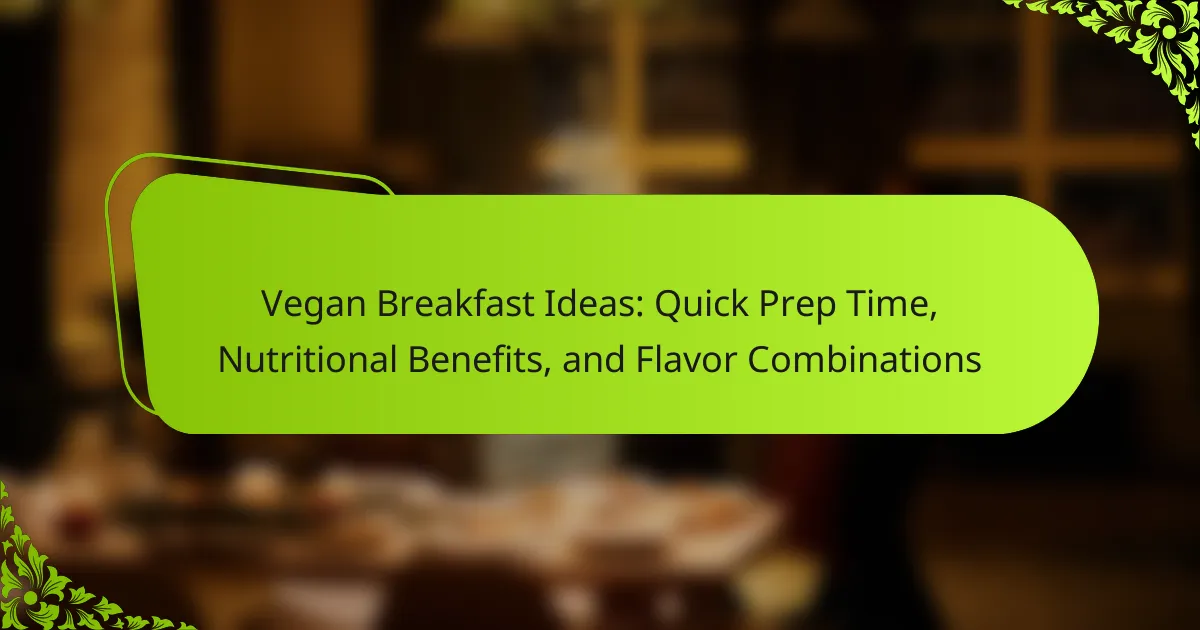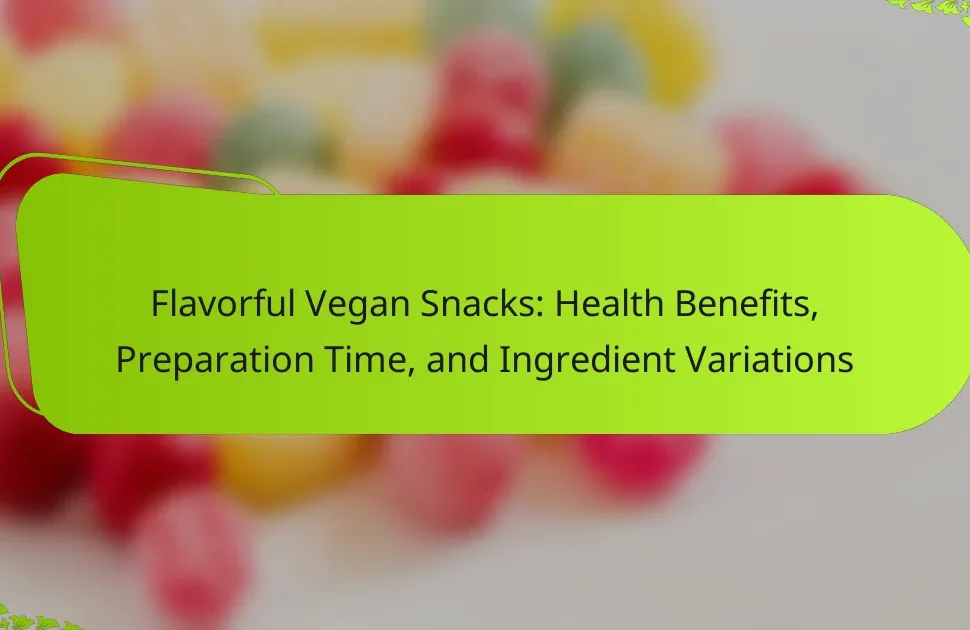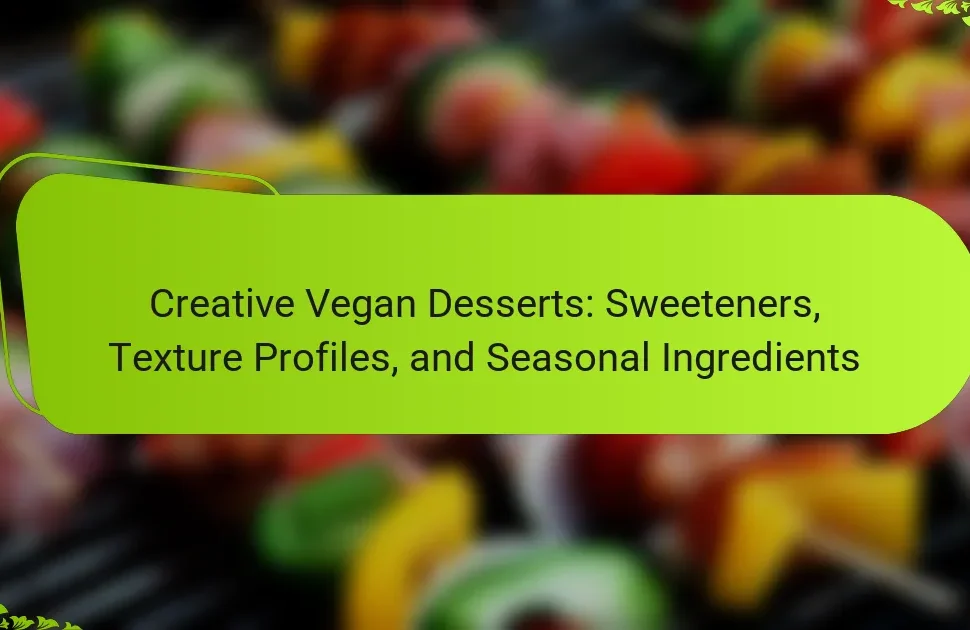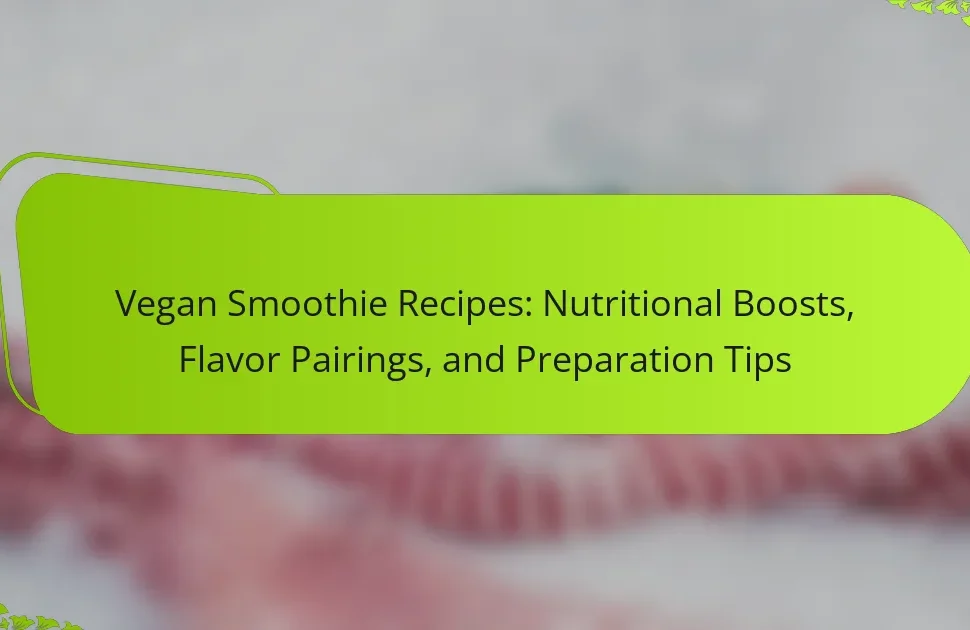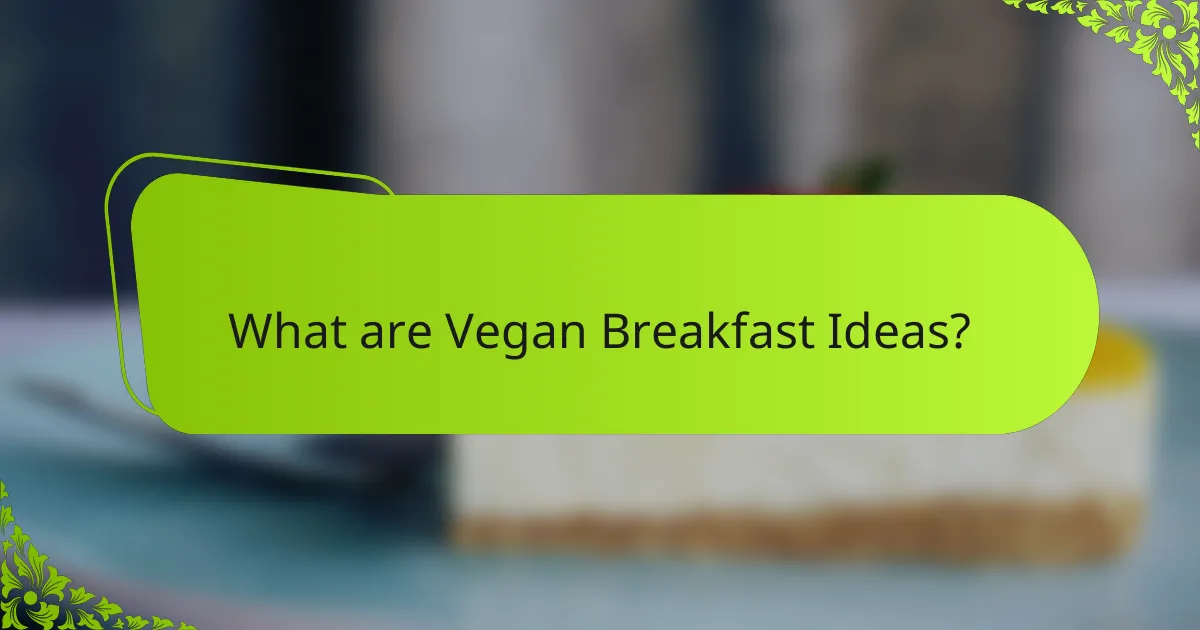
What are Vegan Breakfast Ideas?
Vegan breakfast ideas include a variety of plant-based meals. Common options are smoothies, oatmeal, and avocado toast. Smoothies can be made with fruits, vegetables, and plant-based milk. Oatmeal can be topped with fruits, nuts, and seeds for added flavor and nutrition. Avocado toast is often served on whole grain bread with toppings like tomatoes or sprouts. Chia seed pudding is another popular choice, made by soaking chia seeds in almond milk. Vegan pancakes can be made using flour, plant milk, and a sweetener. These meals provide essential nutrients and can be prepared quickly.
Why choose vegan breakfast options?
Vegan breakfast options are chosen for their health benefits and environmental impact. They are typically lower in saturated fats and cholesterol. This can reduce the risk of heart disease. Many vegan breakfasts are rich in fiber and essential nutrients. Foods like oats, fruits, and nuts provide sustained energy. A study from the American Journal of Clinical Nutrition shows plant-based diets can improve overall health. Additionally, choosing vegan options supports animal welfare and reduces carbon footprint. A vegan breakfast often includes whole foods, promoting better digestion and weight management.
What are the health implications of a vegan breakfast?
A vegan breakfast can provide numerous health benefits. It typically includes whole grains, fruits, and vegetables. These foods are high in fiber, which aids digestion and promotes satiety. A study published in the Journal of Nutrition found that higher fiber intake is linked to lower body weight and improved heart health. Vegan breakfasts are also often rich in antioxidants from fruits and vegetables. Antioxidants help reduce inflammation and combat oxidative stress. Additionally, plant-based breakfasts can be lower in saturated fats, which may support cardiovascular health. Research indicates that diets low in saturated fats are associated with a reduced risk of heart disease. Overall, a vegan breakfast can contribute to a balanced diet and promote better health outcomes.
How does a vegan breakfast align with dietary preferences?
A vegan breakfast aligns with dietary preferences by offering plant-based options that cater to various nutritional needs. It typically includes fruits, vegetables, grains, nuts, and seeds. These ingredients are rich in fiber, vitamins, and minerals. Many people prefer vegan diets for health, ethical, or environmental reasons. Studies show that plant-based diets can reduce the risk of chronic diseases. A vegan breakfast can also be lower in saturated fats compared to traditional breakfasts. This makes it appealing for those seeking heart health. Additionally, vegan breakfasts can be easily customized to fit personal tastes. This flexibility supports diverse dietary preferences and restrictions.
What are the common ingredients in vegan breakfasts?
Common ingredients in vegan breakfasts include oats, fruits, plant-based milk, and tofu. Oats serve as a versatile base for porridge or overnight oats. Fruits like bananas, berries, and apples add natural sweetness and nutrients. Plant-based milk, such as almond or soy, is often used in smoothies or cereals. Tofu is commonly scrambled as an egg substitute. Other ingredients include nuts, seeds, and whole grain bread for added protein and fiber. These components contribute to a balanced and nutritious vegan breakfast.
Which plant-based proteins can be included?
Common plant-based proteins include lentils, chickpeas, quinoa, and tofu. Lentils provide about 18 grams of protein per cooked cup. Chickpeas offer approximately 15 grams of protein per cooked cup. Quinoa contains around 8 grams of protein per cooked cup and is a complete protein. Tofu, made from soybeans, has about 20 grams of protein per cup. These proteins are versatile and can be easily incorporated into breakfast dishes. They contribute essential amino acids and support muscle health.
What fruits and vegetables enhance vegan breakfast dishes?
Fruits and vegetables that enhance vegan breakfast dishes include bananas, berries, spinach, and avocados. Bananas add natural sweetness and creaminess to smoothies and oatmeal. Berries provide antioxidants and vibrant color to bowls and pancakes. Spinach is rich in iron and can be added to scrambles or smoothies. Avocados offer healthy fats and a creamy texture in toast or salads. These ingredients not only boost nutrition but also improve flavor and presentation.
How can vegan breakfasts be prepared quickly?
Vegan breakfasts can be prepared quickly by utilizing simple ingredients and efficient cooking methods. Overnight oats are a popular choice; they require minimal preparation and can be made in advance. Smoothies are another quick option; blending fruits, vegetables, and plant-based milk takes just a few minutes. Avocado toast is quick to assemble; simply mash avocado on whole grain bread and add toppings. Chia pudding can be prepared overnight, allowing chia seeds to absorb liquid and thicken. Instant oatmeal can be made in under five minutes; just add hot water or plant-based milk. These methods are supported by their simplicity and speed, enabling busy individuals to enjoy nutritious vegan breakfasts without extensive cooking time.
What are some time-saving cooking techniques for vegan breakfasts?
Batch cooking is a time-saving technique for vegan breakfasts. Preparing large quantities of oatmeal or smoothie packs in advance saves time during busy mornings. Overnight oats can be made the night before, requiring no morning prep. Using a microwave for quick cooking of sweet potatoes or grains significantly reduces cooking time. Pre-chopped vegetables for scrambles or stir-fries can streamline the cooking process. Utilizing a blender for smoothies allows for quick nutrient-dense meals. Instant pots can cook grains or legumes rapidly, enhancing efficiency. These techniques not only save time but also ensure nutritious meals are readily available.
Which recipes require minimal prep time?
Smoothie bowls require minimal prep time. They can be made in under 10 minutes. Simply blend fruits, spinach, and a liquid base. Pour into a bowl and top with seeds or nuts. Overnight oats are another quick option. Combine oats, plant-based milk, and toppings the night before. Refrigerate overnight for a ready-to-eat meal. Avocado toast is also quick to prepare. Mash avocado on whole grain bread and add seasonings. These recipes are efficient and nutritious, perfect for busy mornings.
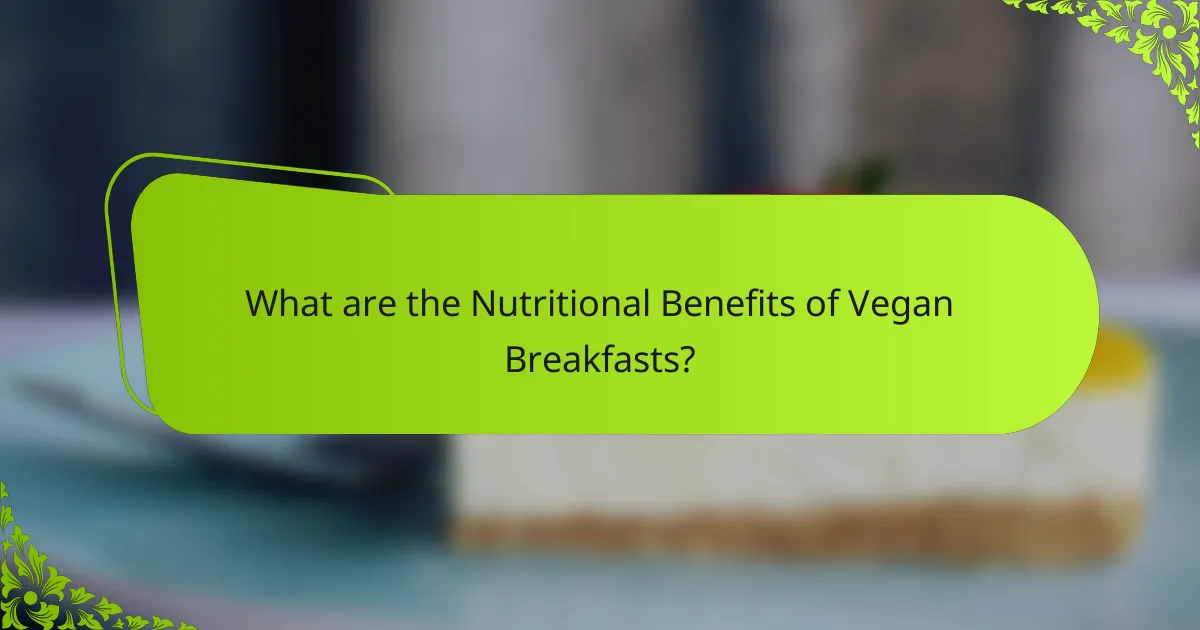
What are the Nutritional Benefits of Vegan Breakfasts?
Vegan breakfasts provide numerous nutritional benefits. They are typically high in fiber, which aids digestion and promotes satiety. Many vegan breakfast options are rich in vitamins and minerals, such as vitamin C, potassium, and magnesium. These nutrients support overall health and immune function. Vegan breakfasts often include whole grains, which contribute to sustained energy levels throughout the morning. They are also low in saturated fats, reducing the risk of heart disease. Plant-based proteins found in foods like legumes and nuts support muscle health and repair. Additionally, vegan breakfasts are often lower in calories, making them a weight management-friendly choice. Research indicates that a plant-based diet can lower cholesterol levels and improve heart health.
How do vegan breakfasts contribute to overall health?
Vegan breakfasts contribute to overall health by providing essential nutrients and promoting better dietary choices. They are typically rich in fiber, vitamins, and minerals. For example, whole grains, fruits, and vegetables are common in vegan breakfasts. These foods support digestive health and may reduce the risk of chronic diseases. Research shows that a plant-based diet can lower blood pressure and cholesterol levels. Additionally, vegan breakfasts are often lower in saturated fats. This can lead to improved heart health. A study published in the Journal of Nutrition found that individuals consuming plant-based diets had lower rates of obesity. Overall, vegan breakfasts can enhance overall well-being and support a balanced diet.
What essential nutrients are found in vegan breakfast foods?
Vegan breakfast foods contain essential nutrients such as protein, fiber, vitamins, and minerals. Common sources of protein include tofu, tempeh, and legumes. Fiber is abundant in whole grains, fruits, and vegetables. Vitamins like B12 can be found in fortified plant-based milks and cereals. Iron is present in leafy greens and legumes, while calcium is available in fortified plant-based products. Omega-3 fatty acids can be sourced from flaxseeds and chia seeds. These nutrients contribute to overall health and wellness, supporting energy levels and bodily functions.
How can a vegan breakfast support weight management?
A vegan breakfast can support weight management by providing low-calorie, nutrient-dense options. Plant-based foods are typically high in fiber, which promotes satiety and reduces overall calorie intake. For example, oatmeal topped with fruits offers complex carbohydrates and fiber, keeping you full longer. Smoothies made with leafy greens and fruits are low in calories but high in vitamins and minerals. Research shows that diets rich in fruits and vegetables are linked to lower body weight. A study published in the Journal of Nutrition found that individuals consuming plant-based diets had a lower risk of obesity. Thus, incorporating a vegan breakfast can effectively aid in weight management.
Why are whole foods important in vegan breakfasts?
Whole foods are important in vegan breakfasts because they provide essential nutrients and health benefits. Whole foods include fruits, vegetables, whole grains, nuts, and seeds. These foods are minimally processed, retaining their natural vitamins, minerals, and fiber. For instance, fiber aids digestion and helps maintain a healthy weight. Whole foods also offer a variety of antioxidants that combat inflammation and support overall health. Studies show that diets rich in whole foods can reduce the risk of chronic diseases. Incorporating whole foods into vegan breakfasts enhances nutrient density and promotes sustained energy levels throughout the day.
What role do whole grains play in nutrition?
Whole grains are essential in nutrition as they provide vital nutrients and health benefits. They are rich in dietary fiber, which aids digestion and promotes satiety. Whole grains also contain important vitamins and minerals, such as B vitamins, iron, magnesium, and selenium. Research indicates that consuming whole grains can lower the risk of heart disease, type 2 diabetes, and certain cancers. A study published in the Journal of Nutrition found that individuals who consume whole grains regularly have a lower body mass index (BMI) and improved metabolic health. Whole grains also help maintain stable blood sugar levels due to their low glycemic index. Overall, incorporating whole grains into a diet supports overall health and well-being.
How do fruits and vegetables enhance nutrient intake?
Fruits and vegetables enhance nutrient intake by providing essential vitamins, minerals, and fiber. They are rich in vitamins such as vitamin C, vitamin A, and various B vitamins. These vitamins support immune function, vision, and energy metabolism. Minerals like potassium and magnesium found in these foods help regulate blood pressure and muscle function. Additionally, fruits and vegetables contain dietary fiber, which aids digestion and promotes satiety. Studies show that diets high in fruits and vegetables can reduce the risk of chronic diseases. The World Health Organization recommends consuming at least 400 grams of fruits and vegetables daily for optimal health.
What are the potential drawbacks of vegan breakfasts?
Vegan breakfasts can have potential drawbacks such as nutrient deficiencies. Some individuals may not get enough protein without animal products. Vegan diets may also lack vitamin B12, which is primarily found in animal sources. Iron absorption can be lower in plant-based foods compared to meat. Additionally, some vegan options can be high in refined sugars and low in fiber. This can lead to blood sugar spikes. Lastly, convenience can be an issue; not all vegan options are quick to prepare. These factors can affect overall health if not properly managed.
How can one ensure adequate protein intake in vegan breakfasts?
To ensure adequate protein intake in vegan breakfasts, include high-protein ingredients. Options like tofu, tempeh, and legumes are excellent choices. Incorporating nut butters and seeds can also boost protein content. Whole grains such as quinoa and oats provide additional protein. Smoothies made with plant-based protein powders offer a quick solution. Chia seeds and hemp seeds are nutrient-dense additions. Aiming for 15-25 grams of protein per meal supports dietary needs. Studies show that adequate protein intake promotes muscle health and satiety.
What common misconceptions exist about vegan nutrition?
Common misconceptions about vegan nutrition include the belief that it lacks protein. Many assume that plant-based diets do not provide sufficient protein sources. However, foods like lentils, chickpeas, and quinoa are rich in protein. Another misconception is that vegans cannot get enough vitamins and minerals. In reality, a well-planned vegan diet can meet all nutritional needs. Some people think vegan diets are inherently healthy. However, processed vegan foods can be high in sugars and unhealthy fats. Additionally, there is a belief that veganism is too restrictive. In fact, a vegan diet offers a wide variety of foods, including fruits, vegetables, grains, and legumes.

What Flavor Combinations Work Well in Vegan Breakfasts?
Vegan breakfasts benefit from various flavor combinations that enhance taste and nutrition. Common pairings include banana and almond butter, which provide natural sweetness and healthy fats. Another popular combination is avocado and tomato, offering creaminess and acidity. Oatmeal with berries and maple syrup delivers fiber and antioxidants. Chia pudding with coconut milk and mango presents a tropical flavor and omega-3s. Tofu scramble with spinach and nutritional yeast mimics traditional scrambled eggs while adding vitamins. These combinations not only taste great but also contribute to a balanced diet.
How can spices and herbs enhance vegan breakfasts?
Spices and herbs can significantly enhance vegan breakfasts by adding flavor, nutritional value, and variety. They transform plain dishes into vibrant meals. For example, turmeric adds an earthy flavor and is known for its anti-inflammatory properties. Cinnamon can enhance sweetness naturally while providing antioxidants. Basil and oregano can elevate savory dishes like tofu scrambles. Spices like cumin and paprika introduce warmth and depth to breakfast burritos. Herbs such as cilantro and parsley contribute freshness and brightness to dishes. Overall, incorporating spices and herbs makes vegan breakfasts more enjoyable and nutritious.
Which spices are commonly used in vegan dishes?
Common spices used in vegan dishes include cumin, turmeric, paprika, and coriander. Cumin adds an earthy flavor and is often used in curries and stews. Turmeric is known for its vibrant color and health benefits, including anti-inflammatory properties. Paprika provides a sweet and smoky taste, enhancing various dishes. Coriander has a citrusy flavor and is commonly used in salsas and dressings. These spices contribute to the rich flavors and nutritional benefits of vegan cuisine.
What are some herb pairings that work well with breakfast foods?
Basil and tomatoes are a classic pairing that enhances breakfast dishes. Basil adds a fresh, aromatic flavor that complements the sweetness of tomatoes. Chives and scrambled tofu create a savory combination that elevates the dish’s taste. Chives offer a mild onion flavor that pairs well with the creaminess of tofu. Cilantro and avocado work together beautifully in breakfast burritos or on toast. Cilantro provides a bright, citrusy note that balances the richness of avocado. Dill and potatoes are excellent in breakfast hash recipes. Dill’s unique flavor enhances the earthiness of potatoes. Lastly, parsley and quinoa offer a nutritious boost to breakfast bowls. Parsley adds freshness and color to the protein-rich quinoa. These herb pairings not only enhance flavors but also add nutritional benefits to breakfast foods.
What are some popular vegan breakfast recipes?
Popular vegan breakfast recipes include smoothies, oatmeal, and avocado toast. Smoothies can be made with fruits and plant-based milk. Oatmeal can be topped with nuts and fruits for added nutrients. Avocado toast is made by mashing avocado on whole grain bread. Chia seed pudding is another option, requiring chia seeds soaked in plant-based milk. Vegan pancakes made with flour, plant milk, and banana are also popular. Tofu scramble mimics scrambled eggs using crumbled tofu and spices. These recipes are nutritious and quick to prepare, making them ideal for breakfast.
How can smoothies be customized for flavor and nutrition?
Smoothies can be customized for flavor and nutrition by selecting various ingredients. Base liquids such as almond milk or coconut water enhance flavor and nutrient content. Fruits like bananas and berries provide natural sweetness and vitamins. Leafy greens, such as spinach or kale, add fiber and essential nutrients without altering the taste significantly.
Protein sources like nut butter or plant-based protein powder boost the nutritional profile. Superfoods such as chia seeds or spirulina can be incorporated for added health benefits. Flavor can also be enhanced with spices like cinnamon or ginger. Adjusting ingredient ratios allows for unique taste profiles while maintaining nutritional balance.
Research indicates that incorporating diverse ingredients can improve overall nutrient intake (Wang et al., 2020, Journal of Nutrition).
What are some unique pancake or waffle recipes?
Vegan pancakes and waffles can be made with unique ingredients for diverse flavors. One recipe uses mashed bananas for sweetness and moisture. Another incorporates almond flour for a nutty taste and gluten-free option. Sweet potato pancakes add a rich flavor and vibrant color. Matcha pancakes provide a green tea twist, rich in antioxidants. For waffles, consider using oat flour for a hearty texture. Chickpea flour can create savory waffles with a protein boost. Each recipe showcases distinct flavors while remaining plant-based.
What tips can help in creating delicious vegan breakfasts?
Use fresh ingredients to enhance flavor in vegan breakfasts. Incorporating seasonal fruits and vegetables adds natural sweetness and vibrant colors. Experiment with spices and herbs like cinnamon, turmeric, and basil for added depth. Utilize plant-based proteins such as tofu, tempeh, or legumes to create filling meals. Whole grains like oats, quinoa, or whole grain bread provide essential nutrients and texture. Incorporate healthy fats from sources like avocados, nuts, or seeds for richness. Prepare quick recipes, such as smoothies or overnight oats, to save time while enjoying variety. Lastly, presentation matters; a well-plated meal can make a simple dish feel gourmet.
How can one experiment with flavors and textures in vegan cooking?
Experimenting with flavors and textures in vegan cooking can be achieved through various methods. One can combine different spices and herbs to enhance the taste of dishes. For example, using smoked paprika adds depth, while fresh herbs provide brightness. Incorporating various cooking techniques also helps. Roasting vegetables caramelizes their natural sugars, creating a sweet flavor.
Additionally, using different cooking methods like steaming, grilling, or sautéing can alter textures. For instance, grilling tofu gives it a crispy exterior, while steaming keeps it soft. Mixing ingredients with contrasting textures adds interest. Pairing crunchy nuts with creamy avocado creates a satisfying mouthfeel.
Finally, exploring global cuisines introduces new flavor profiles. Asian, Mediterranean, and Latin American dishes offer unique ingredient combinations. By experimenting with these elements, one can create diverse and exciting vegan meals.
What are some common mistakes to avoid when making vegan breakfasts?
Common mistakes to avoid when making vegan breakfasts include neglecting protein sources, which can lead to unbalanced meals. Failing to incorporate a variety of fruits and vegetables can result in a lack of essential nutrients. Overlooking whole grains may cause missed fiber benefits, impacting digestion. Not planning for meal prep can lead to rushed, uninspired breakfasts. Using too much sugar can detract from the health benefits of a vegan diet. Ignoring seasoning and spices may result in bland flavors. Lastly, not paying attention to portion sizes can lead to overeating or undereating. These mistakes can diminish the overall nutritional value and enjoyment of vegan breakfasts.
Vegan breakfast ideas encompass a variety of plant-based meals, including smoothies, oatmeal, avocado toast, and chia seed pudding, all of which offer essential nutrients and can be prepared quickly. These options are chosen for their health benefits, such as lower saturated fats and cholesterol, promoting heart health and weight management. Common ingredients include whole grains, fruits, vegetables, and plant-based proteins, while flavor combinations and spices enhance taste and nutrition. The article also addresses potential drawbacks of vegan breakfasts and provides tips for ensuring balanced nutrition and avoiding common mistakes in preparation.
